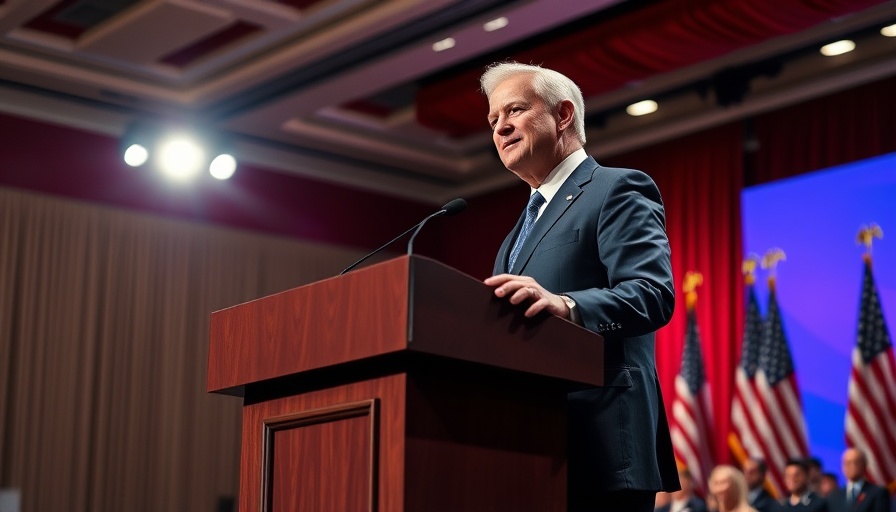
National Guard: A Solution in a Dangerous City?
In the wake of alarming crime rates, Republican candidates for Michigan's governorship are calling for the deployment of the National Guard to Detroit. During an recent issues forum on Mackinac Island, three candidates expressed their support for federal intervention to combat growing concerns over safety in one of America’s most challenged cities. Senate Minority Leader Aric Nesbitt, former House Speaker Tom Leonard, and former Attorney General Mike Cox all voiced their willingness to accept assistance from Washington, D.C., should the offer arise.
Tom Leonard underscored his perspective, amplifying concerns about public safety: “Detroit is still one of the most dangerous cities in the entire country.” Despite Detroit's efforts to curtail violent crime and report the lowest murder rates in decades, the grim reality persists. A mere glance at recent statistics reveals that the city recorded 203 homicides in 2024—a figure that tragically outstrips larger cities like Dallas.
Understanding the Current Crime Landscape
While the numbers may indicate a promising decline in violent crime, the stark reality remains that Detroit's homicide rate continues to dominate national crime conversations. With a homicide rate of 32 per 100,000 people, the city surpasses even Chicago—where rampant gun violence continues to plague its communities.
Still, not everyone agrees with the need for National Guard involvement. Detroit's Mayor Mike Duggan, who is currently running for governor as an independent, suggests that the situation is improving. Mayor Duggan stated, “What we are doing is working and is leading the country, so we don’t need a National Guard person standing on a corner.” His assertion hints at a deeper debate within Michigander communities—can local strategies combat crime effectively without federal intervention?
Dissecting Different Perspectives
The dialogue surrounding the National Guard reflects broader themes in national security and crime management. While some argue for immediate federal assistance, others emphasize the importance of local governance and grassroots initiatives in addressing safety concerns. This bifurcation of opinion begs the question: how do we ensure the safety of Michiganders while simultaneously fostering local empowerment?
Activists and community leaders argue that investing in community programs like youth outreach and job training may provide lasting solutions to crime. Increasing economic opportunities alongside avenues for education can lead to reduced crime rates more effectively than the presence of federal troops on the streets. The challenge remains how best to balance these strategies with immediate safety concerns.
Future Predictions: What Could Happen Next?
The Republican vying for Michigan's governorship will likely continue to address crime rates, especially as the 2026 elections approach. Should federal intervention manifest through the National Guard, it may set a precedent for future governance. Could this lead to a dependency on federal resources, or will it spearhead more localized advancements in public safety?
The conversation about supporting Detroit's communities is part of a larger conversation about American cities facing violence. As crime rates fluctuate, further examination of policies and their effectiveness will remain crucial in influencing public opinion.
The Importance of Community Perspective
For homeowners and potential buyers, these discussions about safety and city intervention resonate on personal levels. With concerns about crime, buyers often weigh the perceived safety of neighborhoods heavily in their decisions. As candidates continue to discuss these pressing matters, residents must engage in dialogue—seeking to understand the implications for their families, homes, and neighborhoods.
As research shows, neighborhoods with better community programs tend to foster lower crime rates—an indicator that addressing root causes can help communities thrive.
Embrace Local Solutions for Long-Term Change
Joint efforts involving community stakeholders, including local officials, law enforcement, and citizens, typically yield the most success in tackling complex issues like crime. From block clubs to mentorship programs, fostering a sense of collaboration and commitment to shared safety goals can unite neighborhoods towards safer, more vibrant communities.
As someone within the Michigan community, you have the power to shape the future of public safety. Engaging with local leaders, staying informed, and advocating for measures that truly build safer environments for all can create a ripple effect in promoting positive change.
Call to Action
Get involved! Join local meetings, engage in grassroots initiatives, and lend your voice to the discussion on public safety in Detroit. Your commitment can make an impact—together, we can work towards creating a city that we all want to call home.
 Add Row
Add Row  Add
Add 



Write A Comment